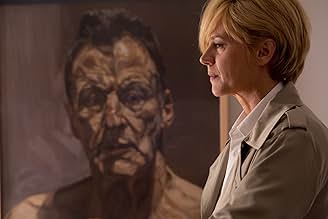AVALIAÇÃO DA IMDb
7,1/10
34 mil
SUA AVALIAÇÃO
Depois de um encontro casual, uma mulher de coração partido decide confrontar sua vida e os eventos mais importantes sobre sua filha encalhada.Depois de um encontro casual, uma mulher de coração partido decide confrontar sua vida e os eventos mais importantes sobre sua filha encalhada.Depois de um encontro casual, uma mulher de coração partido decide confrontar sua vida e os eventos mais importantes sobre sua filha encalhada.
- Indicado para 1 prêmio BAFTA
- 14 vitórias e 62 indicações no total
Darío Grandinetti
- Lorenzo
- (as Dario Grandinetti)
Ramón Agirre
- Inocencio - portero
- (as Ramón Aguirre)
- Direção
- Roteiristas
- Elenco e equipe completos
- Produção, bilheteria e muito mais no IMDbPro
Enredo
Você sabia?
- CuriosidadesThe original screenplay was written in English, and Meryl Streep was approached to play the lead. When Pedro Almodóvar and Agustín Almodóvar went location scouting in Canada, the director felt insecure about filming in a place he didn't really know, in a language he hadn't mastered, with a story he felt worked better in Spain.
- Erros de gravaçãoWhen the train does an emergency brake and luggage and people are being tossed all over the place a coffee cup and coffee pot in front of the main character remains undisturbed.
- ConexõesFeatured in Fandor: The High Art of Pedro Almodóvar's Camp (2018)
- Trilhas sonorasPlaying the Piano 2009
Written and Performed by Ryuichi Sakamoto
Avaliação em destaque
My interest in Almodovar is rather muted. He doesn't excel in any of the ways of presenting the world that really matter to me but he does several things more than well, so every so often I visit. There is the desire to submerge ourselves in fiction, lose ourselves to self in order to wake to a fabric that extends from self. That's Talk to Her for me.
But like Woody Allen or the Coens, he has consistently worked for so long on the same motifs that coming to him is also a matter of is he particularly inspired that day. I'm pleased to say he is.
In the individual pieces of cinematic craft, this is not particularly exceptional. If you're heavily inclined to how story resolves drama, you will see here something that simply trails off near the end. The symbolic motifs greet us upfront; a deer in slow-motion, tumultuous sea out the window. His bright reds on walls and the like are not something I can get excited about, in this or any film.
But he is inspired today on the fundamental matter of self passing through self. He manages to do this with just a few strands of narrative. There is the young woman who was on her way to all life ahead of her that night on the train, who finds herself yanked by unexpected passion. There is the house of passion in the small fishing village, eerily explored with Hitchcock hues. And there is bewildering loss as she wanders away a widowed mother.
Above all I love here the sense of transition. Almodovar does so well - his actress helps - in spinning narrative to explore tragedy. He says enough about the jittery urge for adventure as a story we throw ourselves in so that we can infer more fleeting illusion around the crushing melodrama about life breaking down. She's not just this grieving woman that another film, say, in the realist format would have simply followed around Madrid; we're privy to all this richness of her young self having set off in search. Things couldn't have only worked this way for her, it's important to see; but sometimes they do, sometimes setting out for open sea means finding yourself marooned on an island, nothing right or wrong.
And Almodovar is ineluctably Spanish, meaning Catholic; so communion with the fleeting, transcendent stuff must take place firmly within ritual, in his case (just like Ruiz before) fiction. The whole is narrated by an author writing the story down as she waits in her apartment, shifting us forward and back. It speaks about the imaginative mind being burdened by the narratives of memory. For Almodovar, there is merit in the effort. Had she not stayed behind to write, she would have missed the letter. Even more pertinently for me, there is a bedridden mother (a mirrored woman) who is allowed to languish in her room, written off as an invalid. But when her daughter comes to visit, the recognition nourishes her back to her feet.
But like Woody Allen or the Coens, he has consistently worked for so long on the same motifs that coming to him is also a matter of is he particularly inspired that day. I'm pleased to say he is.
In the individual pieces of cinematic craft, this is not particularly exceptional. If you're heavily inclined to how story resolves drama, you will see here something that simply trails off near the end. The symbolic motifs greet us upfront; a deer in slow-motion, tumultuous sea out the window. His bright reds on walls and the like are not something I can get excited about, in this or any film.
But he is inspired today on the fundamental matter of self passing through self. He manages to do this with just a few strands of narrative. There is the young woman who was on her way to all life ahead of her that night on the train, who finds herself yanked by unexpected passion. There is the house of passion in the small fishing village, eerily explored with Hitchcock hues. And there is bewildering loss as she wanders away a widowed mother.
Above all I love here the sense of transition. Almodovar does so well - his actress helps - in spinning narrative to explore tragedy. He says enough about the jittery urge for adventure as a story we throw ourselves in so that we can infer more fleeting illusion around the crushing melodrama about life breaking down. She's not just this grieving woman that another film, say, in the realist format would have simply followed around Madrid; we're privy to all this richness of her young self having set off in search. Things couldn't have only worked this way for her, it's important to see; but sometimes they do, sometimes setting out for open sea means finding yourself marooned on an island, nothing right or wrong.
And Almodovar is ineluctably Spanish, meaning Catholic; so communion with the fleeting, transcendent stuff must take place firmly within ritual, in his case (just like Ruiz before) fiction. The whole is narrated by an author writing the story down as she waits in her apartment, shifting us forward and back. It speaks about the imaginative mind being burdened by the narratives of memory. For Almodovar, there is merit in the effort. Had she not stayed behind to write, she would have missed the letter. Even more pertinently for me, there is a bedridden mother (a mirrored woman) who is allowed to languish in her room, written off as an invalid. But when her daughter comes to visit, the recognition nourishes her back to her feet.
- chaos-rampant
- 21 de nov. de 2017
- Link permanente
Principais escolhas
Faça login para avaliar e ver a lista de recomendações personalizadas
- How long is Julieta?Fornecido pela Alexa
Detalhes
Bilheteria
- Orçamento
- € 1.350.000 (estimativa)
- Faturamento bruto nos EUA e Canadá
- US$ 1.490.948
- Fim de semana de estreia nos EUA e Canadá
- US$ 64.044
- 25 de dez. de 2016
- Faturamento bruto mundial
- US$ 22.521.904
- Tempo de duração1 hora 39 minutos
- Cor
- Mixagem de som
- Proporção
- 1.85 : 1
Contribua para esta página
Sugerir uma alteração ou adicionar conteúdo ausente


![Assistir a Tráiler [OV]](https://m.media-amazon.com/images/M/MV5BYTZiMjRjZWMtM2NmMC00MTNmLWJhMTAtMmJkYjgxNjk3YWVhXkEyXkFqcGdeQXRodW1ibmFpbC1pbml0aWFsaXplcg@@._V1_QL75_UX500_CR0)


























